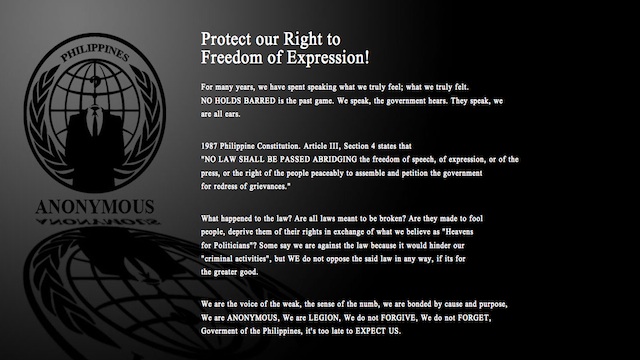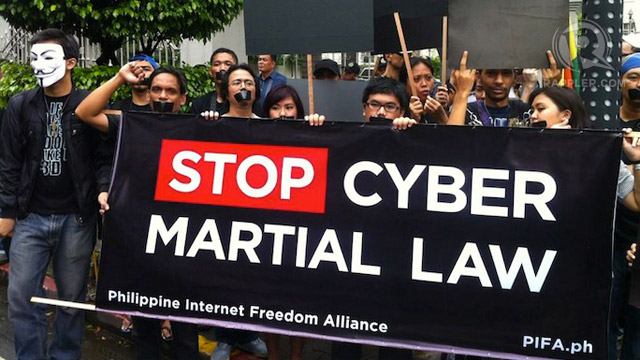SUMMARY
This is AI generated summarization, which may have errors. For context, always refer to the full article.

MANILA, Philippines – Beware, hackers.
Presidential Spokesperson Edwin Lacierda said the National Bureau of Investigation already has leads on the hackers who attacked government websites.
In a press conference on Monday, January 14, Lacierda commented on the series of attacks on government websites amid the debate on the Cybercrime Prevention Act of 2012 last year. Hackers struck again early Monday, on the eve of the Supreme Court oral arguments on the law.
“The NBI has some people in mind already as to who launched the hacking forays into government websites. Let me check with the NBI if there were some actions taken as a result of being able to identify some personalities or individuals concerned,” Lacierda said.
The National Food Authority’s website was among those hacked by a group claiming to be Anonymous Philippines on Monday. In the message it posted, the group questioned the anti-cybercrime law, hinting that it violates freedom of speech and freedom of expression.
Lacierda said following the hacking of government websites last year, Malacañang held a meeting with Louis Napoleon Casambre, executive director of the Science Department’s Information and Communications Technology Office.
“They’re coming up with a plan to strengthen the firewall or strengthen the security of government websites,” Lacierda said.
Among the suggestions was to transfer the hosting of government websites to the Department of Science and Technology (DOST). Lacierda said websites hosted by the DOST like the Official Gazette have been secure despite attempted attacks.
“Some government websites are hosted by private entities and there has been a suggestion to move them, migrate their hosting to government. So that’s being studied right now,” Lacierda added.
Malacañang has condemned the incidents of hacking, urging critics of the anti-cybercrime law to engage in debate instead of defacing government websites.

Guingona to speak in SC debate
The cybercrime law stirred controversy after President Benigno Aquino III signed it into law in September 2012.
Sixteen petitions have been filed before the Supreme Court against it. Human rights groups, Internet users, journalists, bloggers, and academics have said the law gives government too much power over netizens, violating freedom of speech, freedom of expression, and privacy.
Ahead of the Supreme Court debate, the office of Sen Teofisto “TG” Guingona III announced that the senator will deliver an opening statement in the oral arguments on Tuesday, January 15.
Guingona was the lone senator who opposed the cybercrime law when the Senate passed it last year. He has criticized it as vague, oppressive, and demonizing technology.
After Guingona’s opening statement, 5 lawyers will argue against specific provisions of the law:
- University of the Philippines law professor Harry Roque on online libel and cybersex
- Bayan Muna Rep Neri Colmenares on the provision imposing a penalty for cybercrimes of one degree higher than crimes under the Revised Penal Code, and the provision that prosecution under the cybercrime law shall be “without prejudice to any liability” under the Code or special laws
- Lawyer Rodel Cruz on the provision authorizing the Justice Department to block or restrict access to computer data even without a court order
- UP Law Professor JJ Disini on the provision allowing law enforcement officials to collect traffic data in real-time, also without a court order
- Lawyer Julius Matibag on the provision punishing people guilty of “aiding and abetting” the commission of a cybercrime
The Supreme Court scheduled two days of oral arguments, with part two set on January 22.
Even ahead of the debates though, the Office of the Solicitor General has conceded that the provision giving the Justice Department power to block access to computer data, and that allowing officials to collect traffic data are problematic.
Lawmakers have proposed various amendments to the law but the bills are still in the early stages.
Critics of the anti-cybercrime law doubt Congress will have enough time to pass the amendments, with only 9 session days left when Congress re-opens next week.
Some petitioners have asked the Supreme Court to extend the 120-day temporary restraining order on the implementation of the law. The high court issued the order in October.
The order is set to lapse on February 6.
Groups opposing the law scheduled a protest outside the Supreme Court before the start of the oral arguments on Tuesday. – Rappler.com
More on the Cybercrime law:
- Cybercrime law is defensible – Palace
- SC stops cybercrime law, issues TRO
- #TalkThursday: Ted Te on cybercrime
- Websites hacked in protest vs new law
- Cybercrime law: Demonizing technology
- DOJ ‘great firewall of China’ under new law
- Cybercrime law: ’50 shades of liability’
- Lawyer asks SC to nullify parts of Cybercrime Act
Add a comment
How does this make you feel?
There are no comments yet. Add your comment to start the conversation.